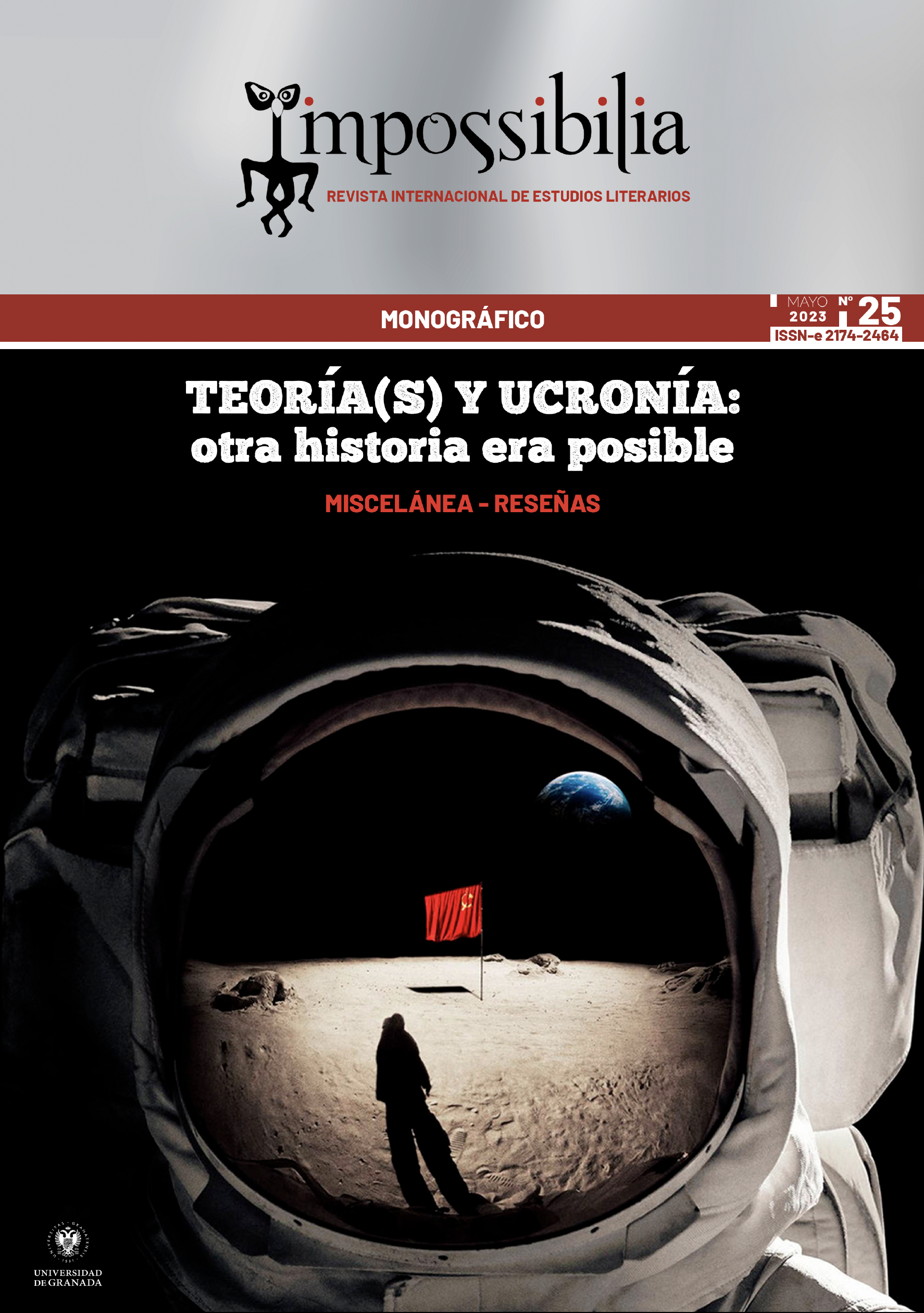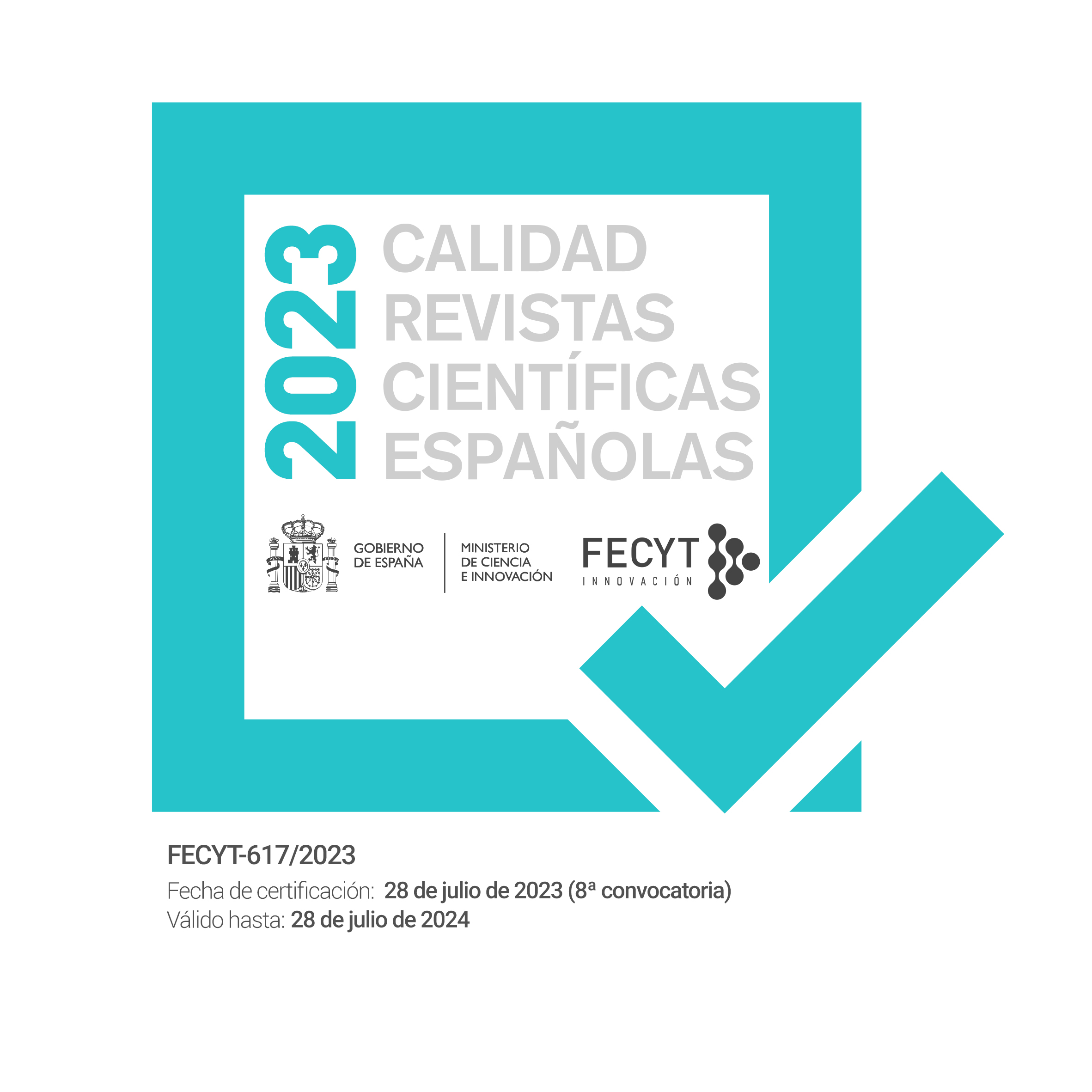Technology and Catastrophism: an Analyss of Necessity and Contingency in William Gibson and Bruce Sterling’s "The Difference Engine"
DOI:
https://doi.org/10.30827/impossibilia.252023.26935Keywords:
William Gibson, Bruce Sterling, La máquina diferencial, ucronía, causalidad, necesidad y contingencia.Abstract
If there is something that has characterized most of the studies on alternate history works over the last decades, is the lack of consensus regarding its true nature, making it difficult for scholars to find a proper definition of the literary genre. In 2013, Kathleen Single releases her book Alternate History: Playing with Necessity and Contingency, in which she suggests a defining feature of alternate histories: the contemplation of the paradoxical notions of necessity and contingency. Consequently, the main purpose of this article is to showcase the various ways in which the William Gibson and Bruce Sterling’s novel The Difference Engine (1990) manifests this feature, thus proving that Singles’ claim is a valuable contribution to the field of alternate history studies.
Downloads
References
ALKON, Paul. (1994). Alternate History and Postmodern Temporality. En CLEARY, Thomas R. Time, Literature and the Arts: Essays in Honor of Samuel L. Macey (pp. 65-85). Victoria, Canada: University of Victoria.
CARLYLE, Thomas. (1841). On Heroes, Hero-Worship, and the Heroic in History. Project Gutenberg. https://www.gutenberg.org/files/1091/1091-h/1091-h.htm.
DICK, Philip K. (1962). The Man in the High Castle. Milton Keynes, United Kingdom: Penguin.
DISRAELI, Benjamin. (1845). Sybil, or The Two Nations. Oxford: Oxford University Press.
FISCHLIN, Daniel; HOLLINGER, Veronica; TAYLOR, Andrew; GIBSON, William; & STERLING, Bruce. (1992). "The Charisma Leak": A Conversation with William Gibson and Bruce Sterling. Science Fiction Studies 19(1), 1-16.
GALLAGHER, Catherine. (2007). War, Counterfactual History and Alternate-History Novels. Field Day Review, (3), 52-65.
GIBSON, William; & STERLING, Bruce. (1990). The Difference Engine. Londres: Gollancz.
HELLEKSON, Karen. (2001). The Alternate History: Configuring Historical Time. Ohio: The Kent State University Press.
HUTCHEON, Linda. (1989). Historiographic Metafiction: Parody and the Intertextuality of History. En O’DONNELL, Patrick; & CON DAVIS, Robert. Intertextuality and Contemporary American Fiction (pp. 3-32). Baltimore: John Hopkins University Press.
JAGODA, Patrick. (2010). Clacking Control Societies: Steampunk, History, and the Difference Engine of Escape. Neo-Victorian Studies, 3(1), 46-71.
PADUA, Sydney. (2015). The Thrilling Adventures of Lovelace and Babbage: The (Mostly) True Story of the First Computer. Nueva York: Pantheon Books.
PORUSH, David. (1991). Prigogine, Chaos and Contemporary Science Fiction. Science Fiction Studies, 18(3), 367-386.
RANSOM, Amy J. (2010). Warping Time: Alternate History, Historical Fantasy, and the Postmodern uchronie québécoise. Extrapolation, 51(2), 258-280.
REAL ACADEMIA ESPAÑOLA. (2022). Catastrofismo. En Diccionario de la lengua española. https://dle.rae.es/catastrofismo
RICOEUR, Paul. (1983). Time and Narrative: Volume 1. (Trad. MCLAUGHLIN, Kathleen; & PELLAUER, David). Chicago: The University of Chicago Press.
ROSENFELD, Gavriel D. (2002). Why Do We Ask “What If?”: Reflections on the Function of Alternate History. History and Theory, 41(4), 90-103.
ROSENFELD, Gavriel D. (2005). The World Hitler Never Made: Alternate History and the Memory of Nazism. Nueva York: Cambridge University Press.
SCHNEIDER-MAYERSON, Matthew. (2009). What Almost Was: The Politics of the Contemporary Alternate History Novel. American Studies, 50(3/4), 63-83.
SINGLES, Kathleen. (2013). Alternate History: Playing with Contingency and Necessity. Berlín/Boston: Walter de Gruyter.
SCHMUNK, Robert B. (1991). Uchronia: The Alternate History List. HTML. http://www.uchronia.com/
SPEDO, Giampaolo. (2009). The Plot Against the Past: An Exploration of Alternate History in British and American Fiction. [Tesis doctoral no publicada]. Padua: Universidad de Padua.
SPENCER, Nicholas. (1999). Rethinking Ambivalence: Technopolitics and the Luddites in William Gibson and Bruce Sterling’s The Difference Engine. Contemporary Literature, 40(3), 403-429.
SUSSMAN, Herbert. (1994). Cyberpunk Meets Charles Babbage: The Difference Engine as Alternative Victorian History. Victorian Studies 38(1), 1-23.
WHITE, Hayden. (1973). Metahistory: The Historical Imagination in Nineteenth-century Europe. Baltimore: The John Hopkins University Press.
WINTHROP-YOUNG, Geoffrey. (2009). Fallacies and Thresholds: Notes on the Early Evolution of Alternate History. Historical Social Research / Historische Sozialforschung 34(2), 99-117.
Published
How to Cite
Issue
Section
License
Copyright (c) 2023 Impossibilia. Revista Internacional de Estudios Literarios

This work is licensed under a Creative Commons Attribution-NonCommercial-NoDerivatives 4.0 International License.

You are free to share, copy and redistribute the material in any medium or format under the following terms: You must give appropriate credit, you may not use the material for commercial purposes and No Derivatives. Commits to respecting third party intellectual property rights.
Reception and proccesing of papers has no costs for authors.
Author assumes responsibility for the ideas contained in the article.
Papers must be original and must not have been published before and at the moment they are submitted, papers should not be in the process of evaluation by any other electronic or printed media.
The authors are allowed and recommended to publish their published work through the internet. It could produced interesting exchanges and increase the published work citation. (See El efecto del acceso abierto).



















